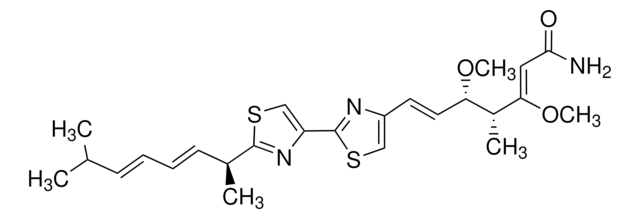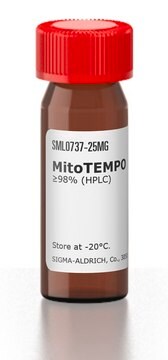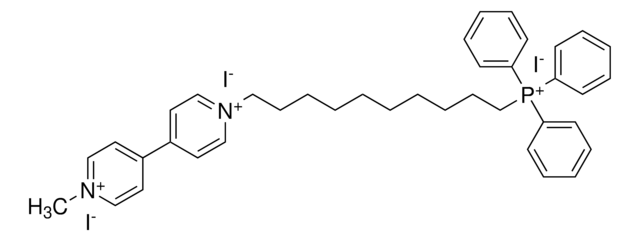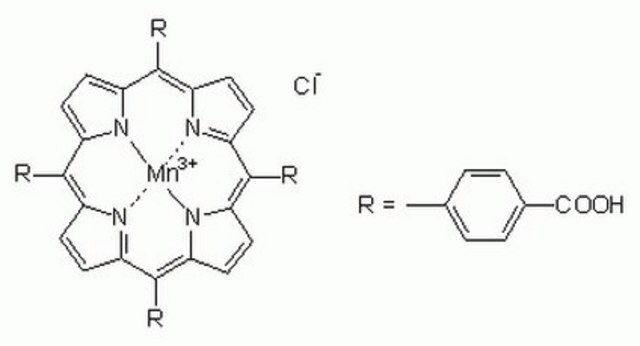SML1554
S3QEL 2
Synonym(e):
1-(3,4-Dimethylphenyl)-N,N-dipropyl-1H-pyrazolo[3,4-d]pyrimidin-4-amine
Anmeldenzur Ansicht organisationsspezifischer und vertraglich vereinbarter Preise
Alle Fotos(1)
About This Item
Empirische Formel (Hill-System):
C19H25N5
CAS-Nummer:
Molekulargewicht:
323.44
UNSPSC-Code:
12352200
NACRES:
NA.77
Empfohlene Produkte
Biochem./physiol. Wirkung
S3QEL 2 is a selective inhibitor of superoxide production from the outer Q-binding site of mitochondrial respiratory complex site III (IIIQo) without altering oxidative phosphorylation.
S3QEL 2 is a selective inhibitor of superoxide production from the outer Q-binding site of mitochondrial respiratory complex site III (IIIQo) without altering oxidative phosphorylation. Site IIIQo is the primary source of mitochondrial reactive oxygen species (ROS) and has been implicated in a broad range of ROS-mediated signaling and pathology. S3QEL 2 lowered HIF-1α induction, protected against ROS-induced, JNK-mediated cell stress in pancreatic beta-cells, and decreased the oxidative stress-induced apoptosis that limits the yield of functional β-cells from intact islets.
S3QEL 2, a cell permeable substituted allopurinol, is also known as 1-(3,4-Dimethylphenyl)-N,N-dipropyl-1H-pyrazolo[3,4-d]pyrimidin-4-amine.
Lagerklassenschlüssel
11 - Combustible Solids
WGK
WGK 3
Flammpunkt (°F)
Not applicable
Flammpunkt (°C)
Not applicable
Hier finden Sie alle aktuellen Versionen:
Analysenzertifikate (COA)
Lot/Batch Number
Die passende Version wird nicht angezeigt?
Wenn Sie eine bestimmte Version benötigen, können Sie anhand der Lot- oder Chargennummer nach einem spezifischen Zertifikat suchen.
Besitzen Sie dieses Produkt bereits?
In der Dokumentenbibliothek finden Sie die Dokumentation zu den Produkten, die Sie kürzlich erworben haben.
The Inhibitor Index: A Desk Reference on Enzyme Inhibitors, Receptor Antagonists, Drugs, Toxins, Poisons, Biologics, and Therapeutic Leads (2017)
Takujiro Homma et al.
Archives of biochemistry and biophysics, 700, 108775-108775 (2021-01-26)
Ferroptosis is a type of iron-dependent, non-apoptotic cell death, which is typically induced by cysteine starvation or by the inhibition of glutathione peroxidase 4 (GPX4) activity with the accompanying elevation in lipid peroxidation product levels. Despite the central role of
Remi Hatinguais et al.
Frontiers in immunology, 12, 641495-641495 (2021-04-13)
Reactive Oxygen Species (ROS) are highly reactive molecules that can induce oxidative stress. For instance, the oxidative burst of immune cells is well known for its ability to inhibit the growth of invading pathogens. However, ROS also mediate redox signalling
Unser Team von Wissenschaftlern verfügt über Erfahrung in allen Forschungsbereichen einschließlich Life Science, Materialwissenschaften, chemischer Synthese, Chromatographie, Analytik und vielen mehr..
Setzen Sie sich mit dem technischen Dienst in Verbindung.








